Research Project: Global Ethics and Sustainability Model in India
VerifiedAdded on 2020/03/16
|36
|9146
|444
Project
AI Summary
This research project examines the role of global ethics and sustainability models within the Indian business context. It begins with an abstract summarizing the impact of globalization, technological advancements, and the evolution of ethical guidelines. The introduction highlights India's vast resources and the importance of ethical business practices for long-term success, given the country's developing economy. The study investigates the acceptance of global ethical guidelines and sustainability models in Indian business operations. It explores the challenges companies face while adopting these models, identifies the positive and negative impacts on company operations, and identifies the future prospects of business organizations after implementing the sustainability model. The literature review covers sustainability, defining sustainable business practices, and discussing the triple bottom line model and the importance of integrating environmental and social considerations into business strategies. The research design includes primary research and analysis to understand the current trends and the acceptance of global ethical guidelines and sustainability models in the operation of the business in India.
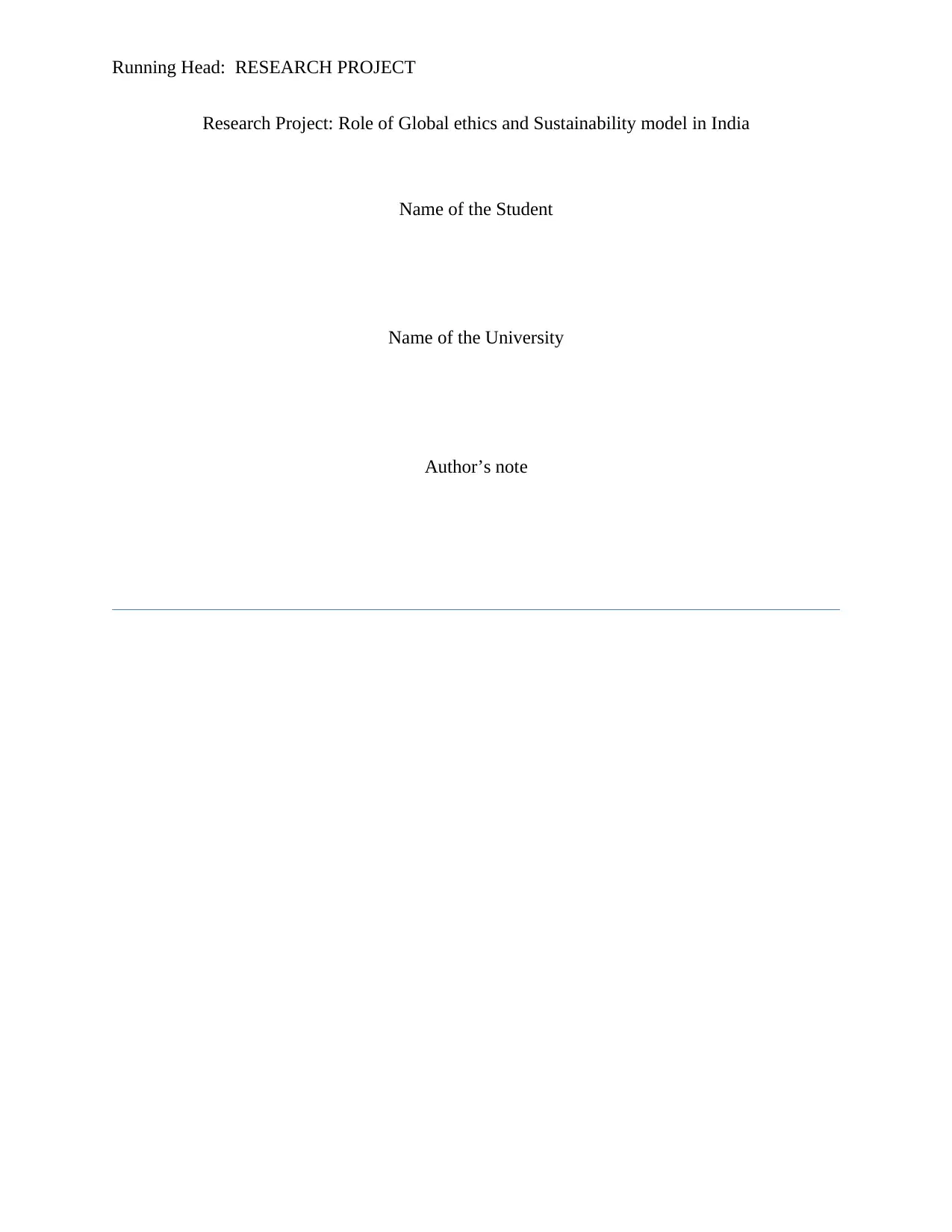
Running Head: RESEARCH PROJECT
Research Project: Role of Global ethics and Sustainability model in India
Name of the Student
Name of the University
Author’s note
Research Project: Role of Global ethics and Sustainability model in India
Name of the Student
Name of the University
Author’s note
Paraphrase This Document
Need a fresh take? Get an instant paraphrase of this document with our AI Paraphraser
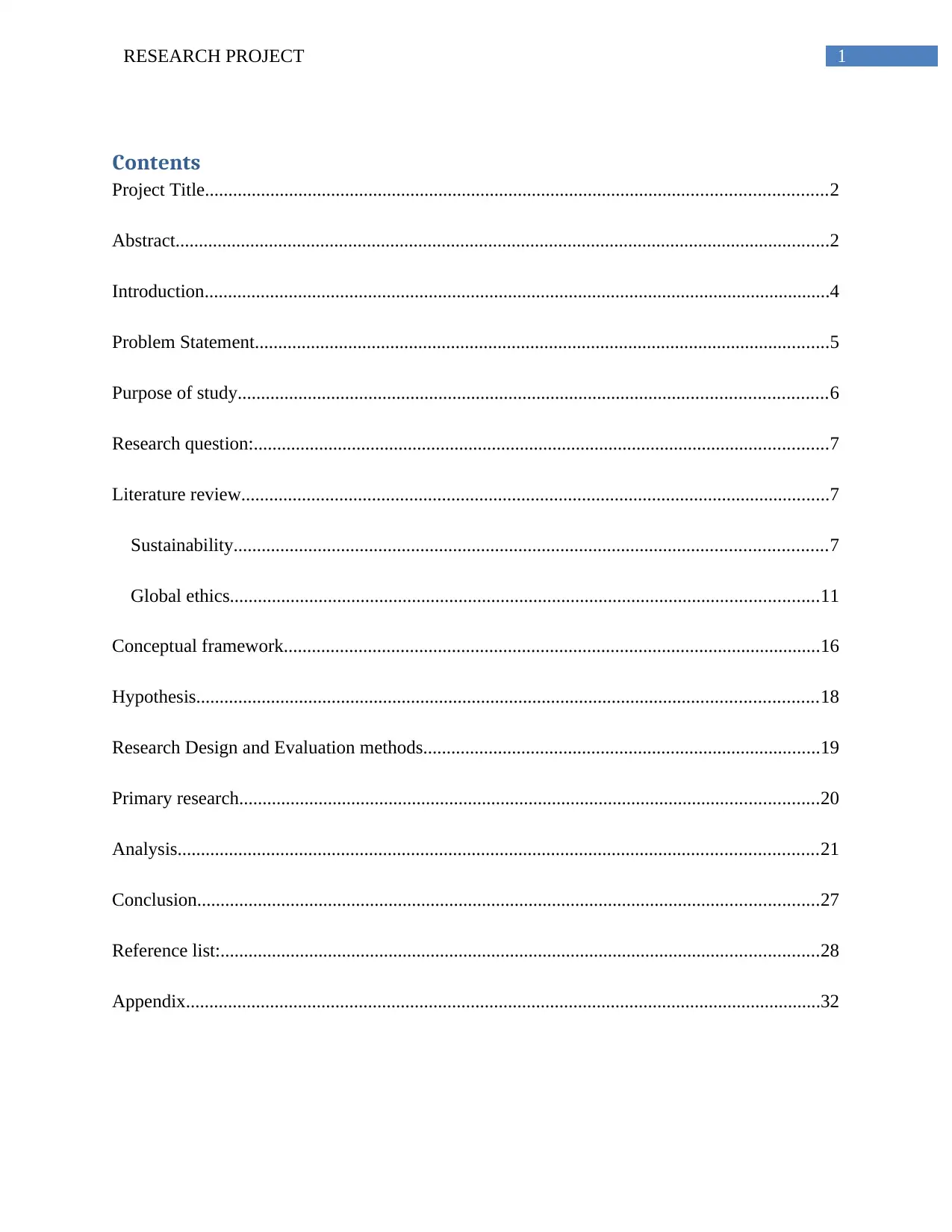
1RESEARCH PROJECT
Contents
Project Title.....................................................................................................................................2
Abstract............................................................................................................................................2
Introduction......................................................................................................................................4
Problem Statement...........................................................................................................................5
Purpose of study..............................................................................................................................6
Research question:...........................................................................................................................7
Literature review..............................................................................................................................7
Sustainability...............................................................................................................................7
Global ethics..............................................................................................................................11
Conceptual framework...................................................................................................................16
Hypothesis.....................................................................................................................................18
Research Design and Evaluation methods.....................................................................................19
Primary research............................................................................................................................20
Analysis.........................................................................................................................................21
Conclusion.....................................................................................................................................27
Reference list:................................................................................................................................28
Appendix........................................................................................................................................32
Contents
Project Title.....................................................................................................................................2
Abstract............................................................................................................................................2
Introduction......................................................................................................................................4
Problem Statement...........................................................................................................................5
Purpose of study..............................................................................................................................6
Research question:...........................................................................................................................7
Literature review..............................................................................................................................7
Sustainability...............................................................................................................................7
Global ethics..............................................................................................................................11
Conceptual framework...................................................................................................................16
Hypothesis.....................................................................................................................................18
Research Design and Evaluation methods.....................................................................................19
Primary research............................................................................................................................20
Analysis.........................................................................................................................................21
Conclusion.....................................................................................................................................27
Reference list:................................................................................................................................28
Appendix........................................................................................................................................32
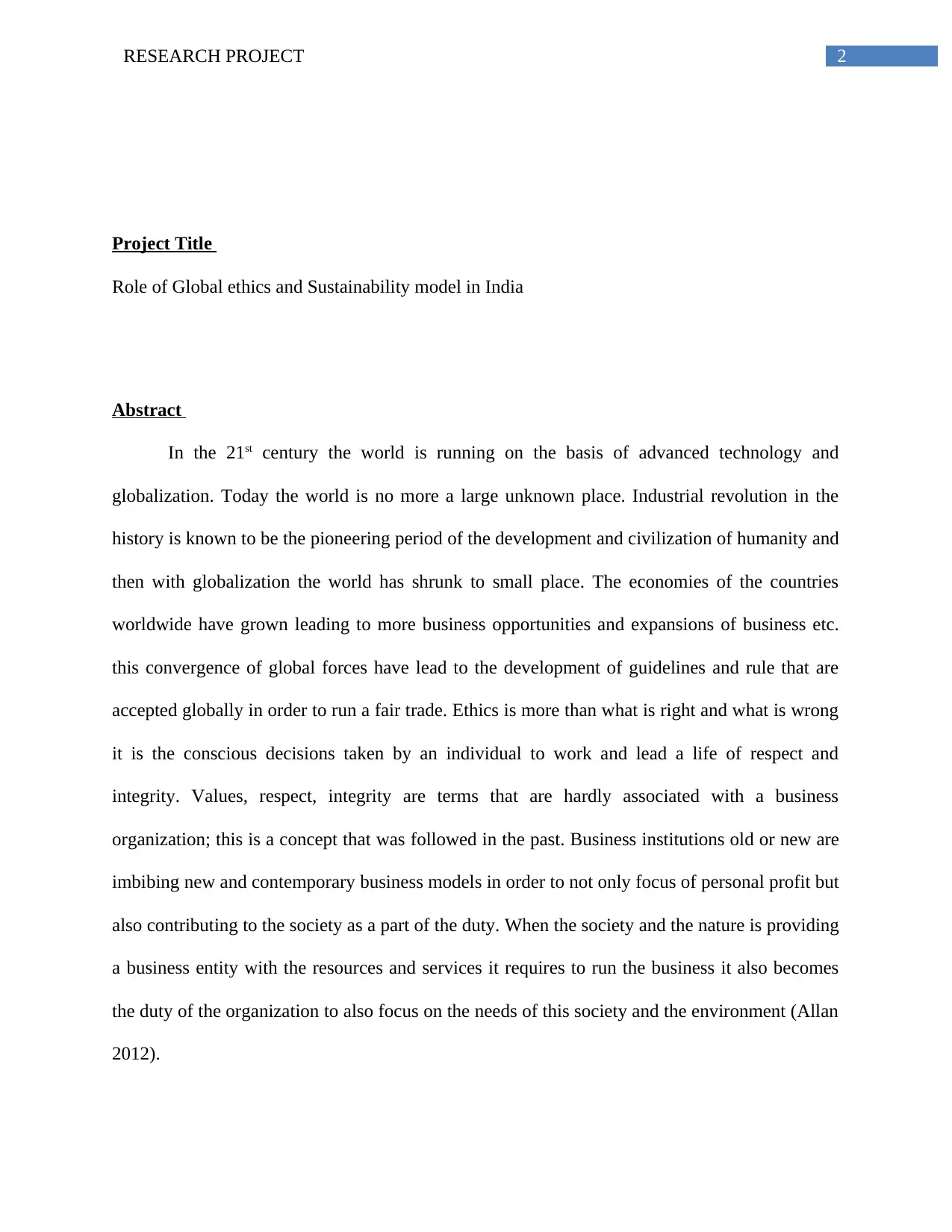
2RESEARCH PROJECT
Project Title
Role of Global ethics and Sustainability model in India
Abstract
In the 21st century the world is running on the basis of advanced technology and
globalization. Today the world is no more a large unknown place. Industrial revolution in the
history is known to be the pioneering period of the development and civilization of humanity and
then with globalization the world has shrunk to small place. The economies of the countries
worldwide have grown leading to more business opportunities and expansions of business etc.
this convergence of global forces have lead to the development of guidelines and rule that are
accepted globally in order to run a fair trade. Ethics is more than what is right and what is wrong
it is the conscious decisions taken by an individual to work and lead a life of respect and
integrity. Values, respect, integrity are terms that are hardly associated with a business
organization; this is a concept that was followed in the past. Business institutions old or new are
imbibing new and contemporary business models in order to not only focus of personal profit but
also contributing to the society as a part of the duty. When the society and the nature is providing
a business entity with the resources and services it requires to run the business it also becomes
the duty of the organization to also focus on the needs of this society and the environment (Allan
2012).
Project Title
Role of Global ethics and Sustainability model in India
Abstract
In the 21st century the world is running on the basis of advanced technology and
globalization. Today the world is no more a large unknown place. Industrial revolution in the
history is known to be the pioneering period of the development and civilization of humanity and
then with globalization the world has shrunk to small place. The economies of the countries
worldwide have grown leading to more business opportunities and expansions of business etc.
this convergence of global forces have lead to the development of guidelines and rule that are
accepted globally in order to run a fair trade. Ethics is more than what is right and what is wrong
it is the conscious decisions taken by an individual to work and lead a life of respect and
integrity. Values, respect, integrity are terms that are hardly associated with a business
organization; this is a concept that was followed in the past. Business institutions old or new are
imbibing new and contemporary business models in order to not only focus of personal profit but
also contributing to the society as a part of the duty. When the society and the nature is providing
a business entity with the resources and services it requires to run the business it also becomes
the duty of the organization to also focus on the needs of this society and the environment (Allan
2012).
⊘ This is a preview!⊘
Do you want full access?
Subscribe today to unlock all pages.

Trusted by 1+ million students worldwide
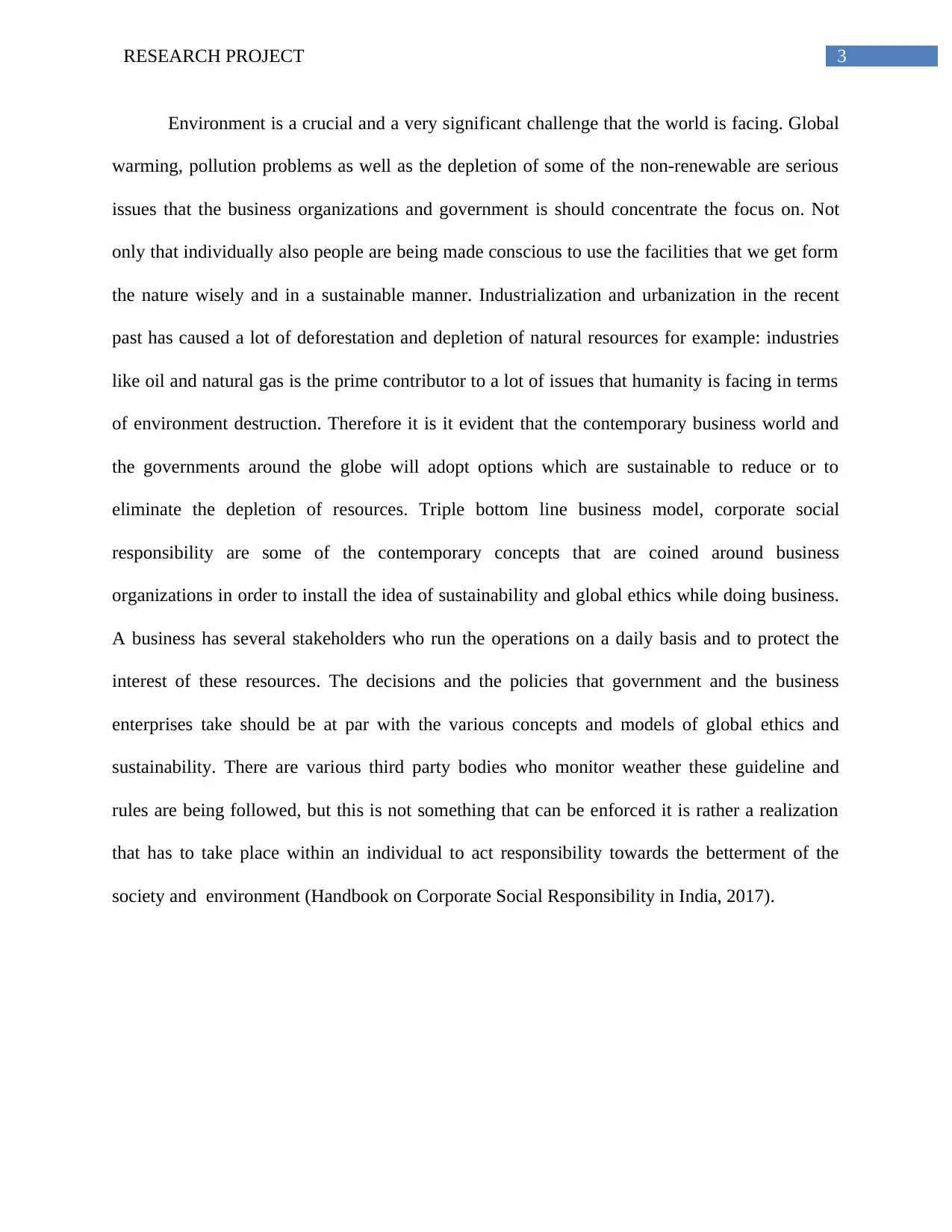
3RESEARCH PROJECT
Environment is a crucial and a very significant challenge that the world is facing. Global
warming, pollution problems as well as the depletion of some of the non-renewable are serious
issues that the business organizations and government is should concentrate the focus on. Not
only that individually also people are being made conscious to use the facilities that we get form
the nature wisely and in a sustainable manner. Industrialization and urbanization in the recent
past has caused a lot of deforestation and depletion of natural resources for example: industries
like oil and natural gas is the prime contributor to a lot of issues that humanity is facing in terms
of environment destruction. Therefore it is it evident that the contemporary business world and
the governments around the globe will adopt options which are sustainable to reduce or to
eliminate the depletion of resources. Triple bottom line business model, corporate social
responsibility are some of the contemporary concepts that are coined around business
organizations in order to install the idea of sustainability and global ethics while doing business.
A business has several stakeholders who run the operations on a daily basis and to protect the
interest of these resources. The decisions and the policies that government and the business
enterprises take should be at par with the various concepts and models of global ethics and
sustainability. There are various third party bodies who monitor weather these guideline and
rules are being followed, but this is not something that can be enforced it is rather a realization
that has to take place within an individual to act responsibility towards the betterment of the
society and environment (Handbook on Corporate Social Responsibility in India, 2017).
Environment is a crucial and a very significant challenge that the world is facing. Global
warming, pollution problems as well as the depletion of some of the non-renewable are serious
issues that the business organizations and government is should concentrate the focus on. Not
only that individually also people are being made conscious to use the facilities that we get form
the nature wisely and in a sustainable manner. Industrialization and urbanization in the recent
past has caused a lot of deforestation and depletion of natural resources for example: industries
like oil and natural gas is the prime contributor to a lot of issues that humanity is facing in terms
of environment destruction. Therefore it is it evident that the contemporary business world and
the governments around the globe will adopt options which are sustainable to reduce or to
eliminate the depletion of resources. Triple bottom line business model, corporate social
responsibility are some of the contemporary concepts that are coined around business
organizations in order to install the idea of sustainability and global ethics while doing business.
A business has several stakeholders who run the operations on a daily basis and to protect the
interest of these resources. The decisions and the policies that government and the business
enterprises take should be at par with the various concepts and models of global ethics and
sustainability. There are various third party bodies who monitor weather these guideline and
rules are being followed, but this is not something that can be enforced it is rather a realization
that has to take place within an individual to act responsibility towards the betterment of the
society and environment (Handbook on Corporate Social Responsibility in India, 2017).
Paraphrase This Document
Need a fresh take? Get an instant paraphrase of this document with our AI Paraphraser
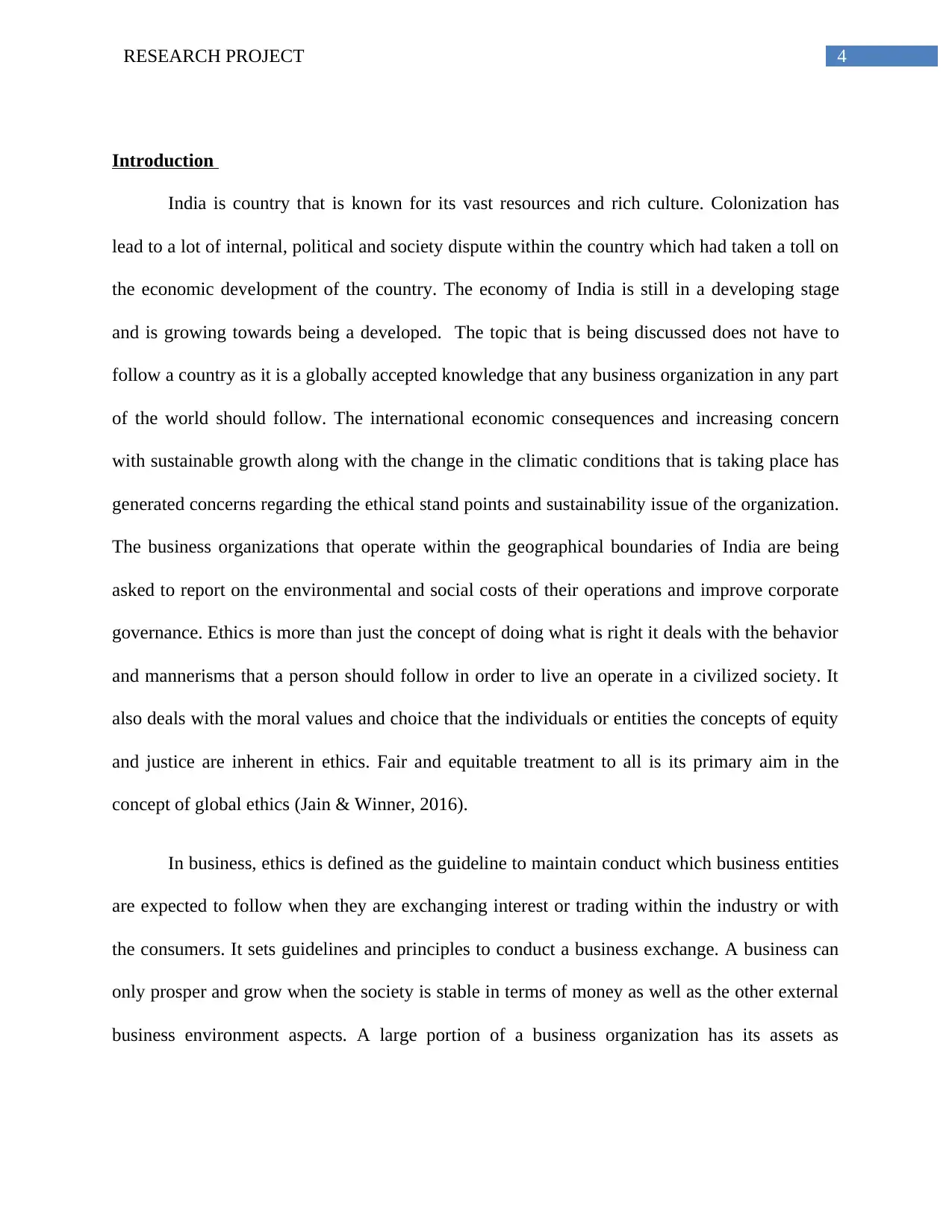
4RESEARCH PROJECT
Introduction
India is country that is known for its vast resources and rich culture. Colonization has
lead to a lot of internal, political and society dispute within the country which had taken a toll on
the economic development of the country. The economy of India is still in a developing stage
and is growing towards being a developed. The topic that is being discussed does not have to
follow a country as it is a globally accepted knowledge that any business organization in any part
of the world should follow. The international economic consequences and increasing concern
with sustainable growth along with the change in the climatic conditions that is taking place has
generated concerns regarding the ethical stand points and sustainability issue of the organization.
The business organizations that operate within the geographical boundaries of India are being
asked to report on the environmental and social costs of their operations and improve corporate
governance. Ethics is more than just the concept of doing what is right it deals with the behavior
and mannerisms that a person should follow in order to live an operate in a civilized society. It
also deals with the moral values and choice that the individuals or entities the concepts of equity
and justice are inherent in ethics. Fair and equitable treatment to all is its primary aim in the
concept of global ethics (Jain & Winner, 2016).
In business, ethics is defined as the guideline to maintain conduct which business entities
are expected to follow when they are exchanging interest or trading within the industry or with
the consumers. It sets guidelines and principles to conduct a business exchange. A business can
only prosper and grow when the society is stable in terms of money as well as the other external
business environment aspects. A large portion of a business organization has its assets as
Introduction
India is country that is known for its vast resources and rich culture. Colonization has
lead to a lot of internal, political and society dispute within the country which had taken a toll on
the economic development of the country. The economy of India is still in a developing stage
and is growing towards being a developed. The topic that is being discussed does not have to
follow a country as it is a globally accepted knowledge that any business organization in any part
of the world should follow. The international economic consequences and increasing concern
with sustainable growth along with the change in the climatic conditions that is taking place has
generated concerns regarding the ethical stand points and sustainability issue of the organization.
The business organizations that operate within the geographical boundaries of India are being
asked to report on the environmental and social costs of their operations and improve corporate
governance. Ethics is more than just the concept of doing what is right it deals with the behavior
and mannerisms that a person should follow in order to live an operate in a civilized society. It
also deals with the moral values and choice that the individuals or entities the concepts of equity
and justice are inherent in ethics. Fair and equitable treatment to all is its primary aim in the
concept of global ethics (Jain & Winner, 2016).
In business, ethics is defined as the guideline to maintain conduct which business entities
are expected to follow when they are exchanging interest or trading within the industry or with
the consumers. It sets guidelines and principles to conduct a business exchange. A business can
only prosper and grow when the society is stable in terms of money as well as the other external
business environment aspects. A large portion of a business organization has its assets as
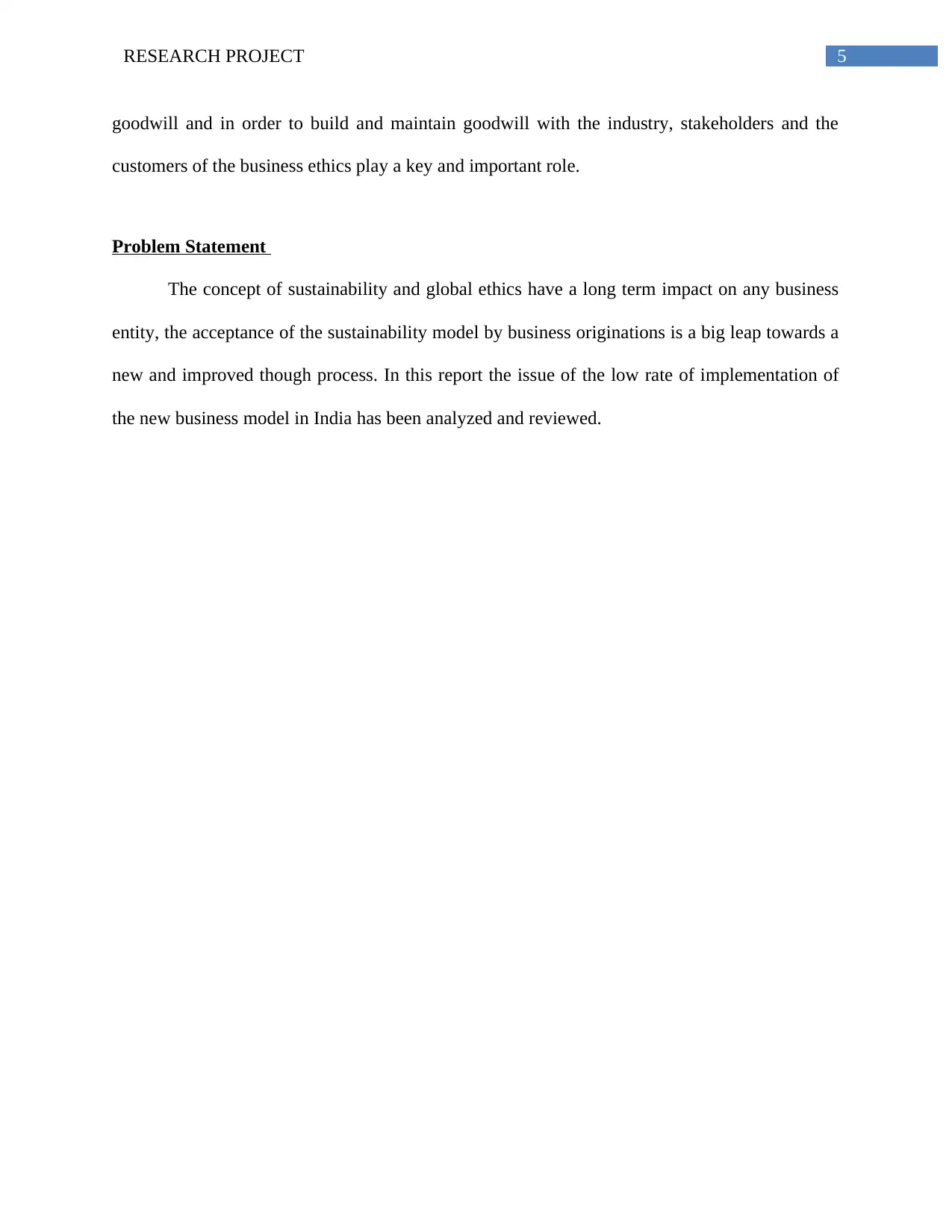
5RESEARCH PROJECT
goodwill and in order to build and maintain goodwill with the industry, stakeholders and the
customers of the business ethics play a key and important role.
Problem Statement
The concept of sustainability and global ethics have a long term impact on any business
entity, the acceptance of the sustainability model by business originations is a big leap towards a
new and improved though process. In this report the issue of the low rate of implementation of
the new business model in India has been analyzed and reviewed.
goodwill and in order to build and maintain goodwill with the industry, stakeholders and the
customers of the business ethics play a key and important role.
Problem Statement
The concept of sustainability and global ethics have a long term impact on any business
entity, the acceptance of the sustainability model by business originations is a big leap towards a
new and improved though process. In this report the issue of the low rate of implementation of
the new business model in India has been analyzed and reviewed.
⊘ This is a preview!⊘
Do you want full access?
Subscribe today to unlock all pages.

Trusted by 1+ million students worldwide
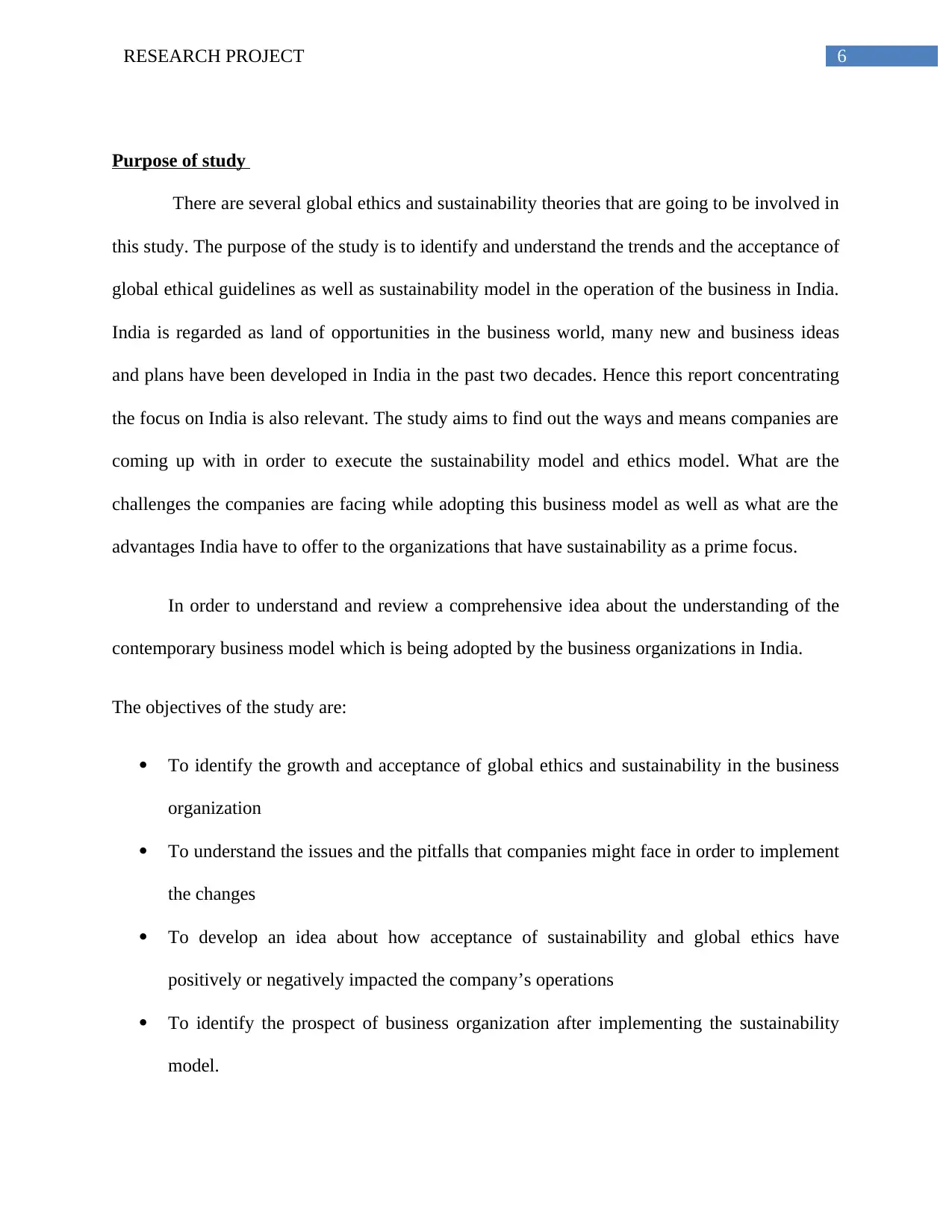
6RESEARCH PROJECT
Purpose of study
There are several global ethics and sustainability theories that are going to be involved in
this study. The purpose of the study is to identify and understand the trends and the acceptance of
global ethical guidelines as well as sustainability model in the operation of the business in India.
India is regarded as land of opportunities in the business world, many new and business ideas
and plans have been developed in India in the past two decades. Hence this report concentrating
the focus on India is also relevant. The study aims to find out the ways and means companies are
coming up with in order to execute the sustainability model and ethics model. What are the
challenges the companies are facing while adopting this business model as well as what are the
advantages India have to offer to the organizations that have sustainability as a prime focus.
In order to understand and review a comprehensive idea about the understanding of the
contemporary business model which is being adopted by the business organizations in India.
The objectives of the study are:
To identify the growth and acceptance of global ethics and sustainability in the business
organization
To understand the issues and the pitfalls that companies might face in order to implement
the changes
To develop an idea about how acceptance of sustainability and global ethics have
positively or negatively impacted the company’s operations
To identify the prospect of business organization after implementing the sustainability
model.
Purpose of study
There are several global ethics and sustainability theories that are going to be involved in
this study. The purpose of the study is to identify and understand the trends and the acceptance of
global ethical guidelines as well as sustainability model in the operation of the business in India.
India is regarded as land of opportunities in the business world, many new and business ideas
and plans have been developed in India in the past two decades. Hence this report concentrating
the focus on India is also relevant. The study aims to find out the ways and means companies are
coming up with in order to execute the sustainability model and ethics model. What are the
challenges the companies are facing while adopting this business model as well as what are the
advantages India have to offer to the organizations that have sustainability as a prime focus.
In order to understand and review a comprehensive idea about the understanding of the
contemporary business model which is being adopted by the business organizations in India.
The objectives of the study are:
To identify the growth and acceptance of global ethics and sustainability in the business
organization
To understand the issues and the pitfalls that companies might face in order to implement
the changes
To develop an idea about how acceptance of sustainability and global ethics have
positively or negatively impacted the company’s operations
To identify the prospect of business organization after implementing the sustainability
model.
Paraphrase This Document
Need a fresh take? Get an instant paraphrase of this document with our AI Paraphraser
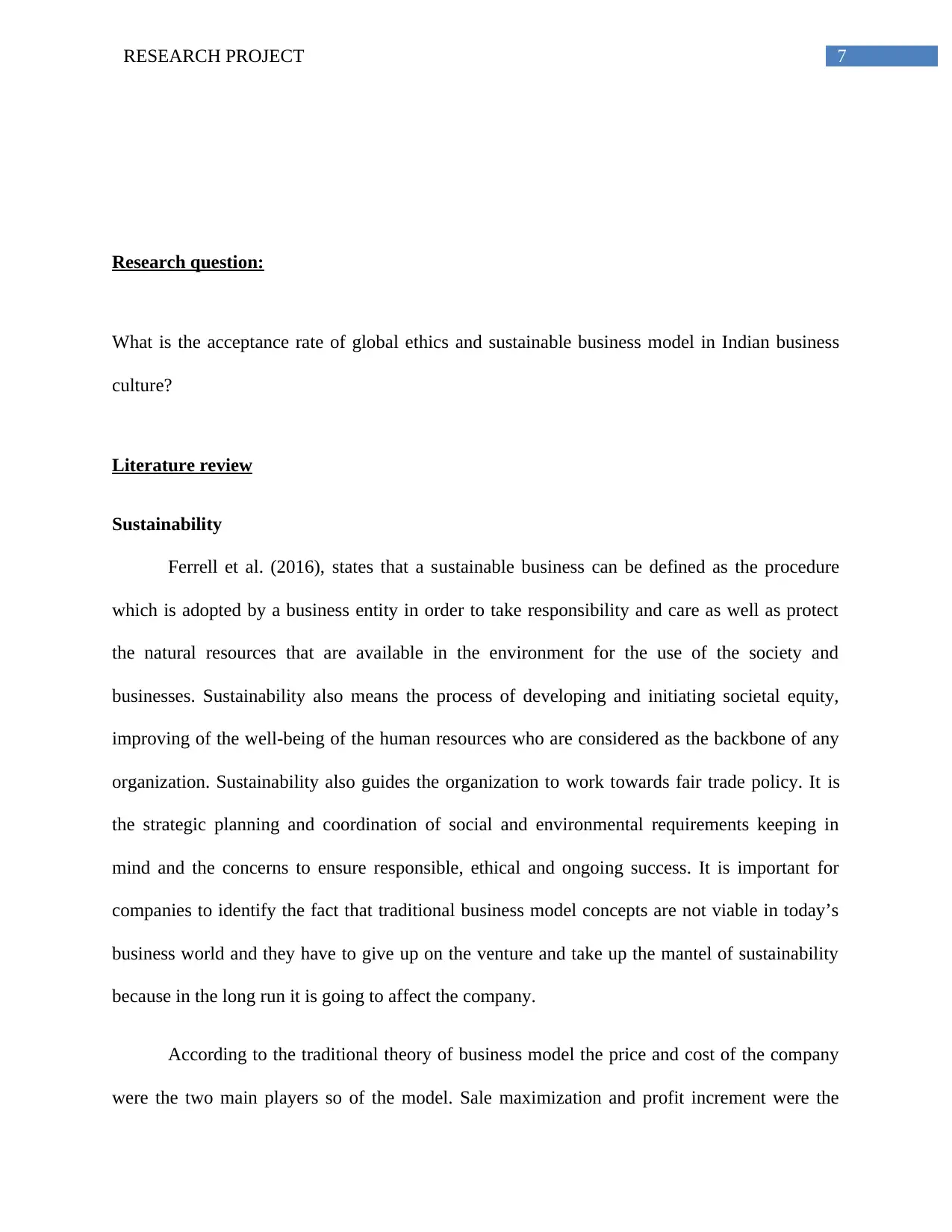
7RESEARCH PROJECT
Research question:
What is the acceptance rate of global ethics and sustainable business model in Indian business
culture?
Literature review
Sustainability
Ferrell et al. (2016), states that a sustainable business can be defined as the procedure
which is adopted by a business entity in order to take responsibility and care as well as protect
the natural resources that are available in the environment for the use of the society and
businesses. Sustainability also means the process of developing and initiating societal equity,
improving of the well-being of the human resources who are considered as the backbone of any
organization. Sustainability also guides the organization to work towards fair trade policy. It is
the strategic planning and coordination of social and environmental requirements keeping in
mind and the concerns to ensure responsible, ethical and ongoing success. It is important for
companies to identify the fact that traditional business model concepts are not viable in today’s
business world and they have to give up on the venture and take up the mantel of sustainability
because in the long run it is going to affect the company.
According to the traditional theory of business model the price and cost of the company
were the two main players so of the model. Sale maximization and profit increment were the
Research question:
What is the acceptance rate of global ethics and sustainable business model in Indian business
culture?
Literature review
Sustainability
Ferrell et al. (2016), states that a sustainable business can be defined as the procedure
which is adopted by a business entity in order to take responsibility and care as well as protect
the natural resources that are available in the environment for the use of the society and
businesses. Sustainability also means the process of developing and initiating societal equity,
improving of the well-being of the human resources who are considered as the backbone of any
organization. Sustainability also guides the organization to work towards fair trade policy. It is
the strategic planning and coordination of social and environmental requirements keeping in
mind and the concerns to ensure responsible, ethical and ongoing success. It is important for
companies to identify the fact that traditional business model concepts are not viable in today’s
business world and they have to give up on the venture and take up the mantel of sustainability
because in the long run it is going to affect the company.
According to the traditional theory of business model the price and cost of the company
were the two main players so of the model. Sale maximization and profit increment were the
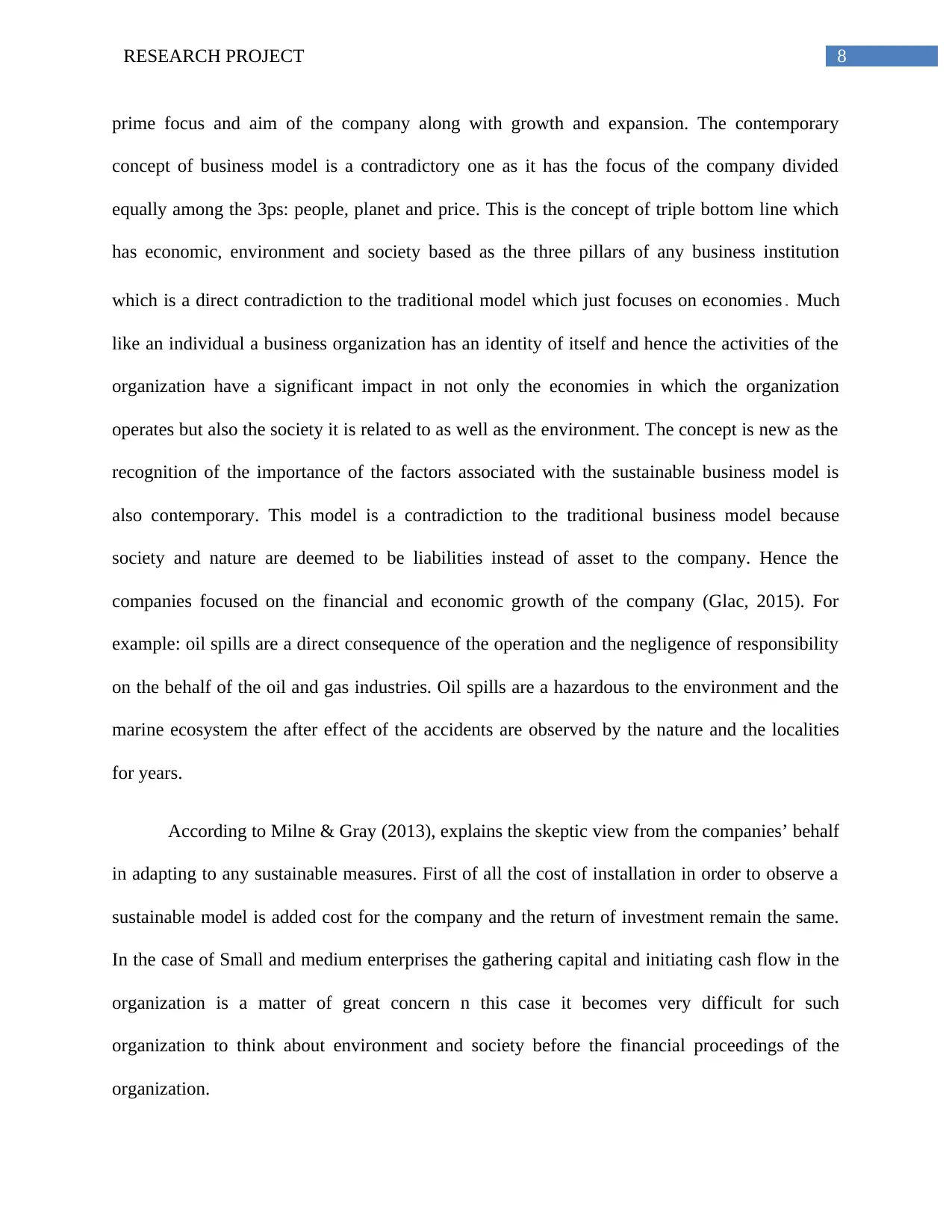
8RESEARCH PROJECT
prime focus and aim of the company along with growth and expansion. The contemporary
concept of business model is a contradictory one as it has the focus of the company divided
equally among the 3ps: people, planet and price. This is the concept of triple bottom line which
has economic, environment and society based as the three pillars of any business institution
which is a direct contradiction to the traditional model which just focuses on economies. Much
like an individual a business organization has an identity of itself and hence the activities of the
organization have a significant impact in not only the economies in which the organization
operates but also the society it is related to as well as the environment. The concept is new as the
recognition of the importance of the factors associated with the sustainable business model is
also contemporary. This model is a contradiction to the traditional business model because
society and nature are deemed to be liabilities instead of asset to the company. Hence the
companies focused on the financial and economic growth of the company (Glac, 2015). For
example: oil spills are a direct consequence of the operation and the negligence of responsibility
on the behalf of the oil and gas industries. Oil spills are a hazardous to the environment and the
marine ecosystem the after effect of the accidents are observed by the nature and the localities
for years.
According to Milne & Gray (2013), explains the skeptic view from the companies’ behalf
in adapting to any sustainable measures. First of all the cost of installation in order to observe a
sustainable model is added cost for the company and the return of investment remain the same.
In the case of Small and medium enterprises the gathering capital and initiating cash flow in the
organization is a matter of great concern n this case it becomes very difficult for such
organization to think about environment and society before the financial proceedings of the
organization.
prime focus and aim of the company along with growth and expansion. The contemporary
concept of business model is a contradictory one as it has the focus of the company divided
equally among the 3ps: people, planet and price. This is the concept of triple bottom line which
has economic, environment and society based as the three pillars of any business institution
which is a direct contradiction to the traditional model which just focuses on economies. Much
like an individual a business organization has an identity of itself and hence the activities of the
organization have a significant impact in not only the economies in which the organization
operates but also the society it is related to as well as the environment. The concept is new as the
recognition of the importance of the factors associated with the sustainable business model is
also contemporary. This model is a contradiction to the traditional business model because
society and nature are deemed to be liabilities instead of asset to the company. Hence the
companies focused on the financial and economic growth of the company (Glac, 2015). For
example: oil spills are a direct consequence of the operation and the negligence of responsibility
on the behalf of the oil and gas industries. Oil spills are a hazardous to the environment and the
marine ecosystem the after effect of the accidents are observed by the nature and the localities
for years.
According to Milne & Gray (2013), explains the skeptic view from the companies’ behalf
in adapting to any sustainable measures. First of all the cost of installation in order to observe a
sustainable model is added cost for the company and the return of investment remain the same.
In the case of Small and medium enterprises the gathering capital and initiating cash flow in the
organization is a matter of great concern n this case it becomes very difficult for such
organization to think about environment and society before the financial proceedings of the
organization.
⊘ This is a preview!⊘
Do you want full access?
Subscribe today to unlock all pages.

Trusted by 1+ million students worldwide
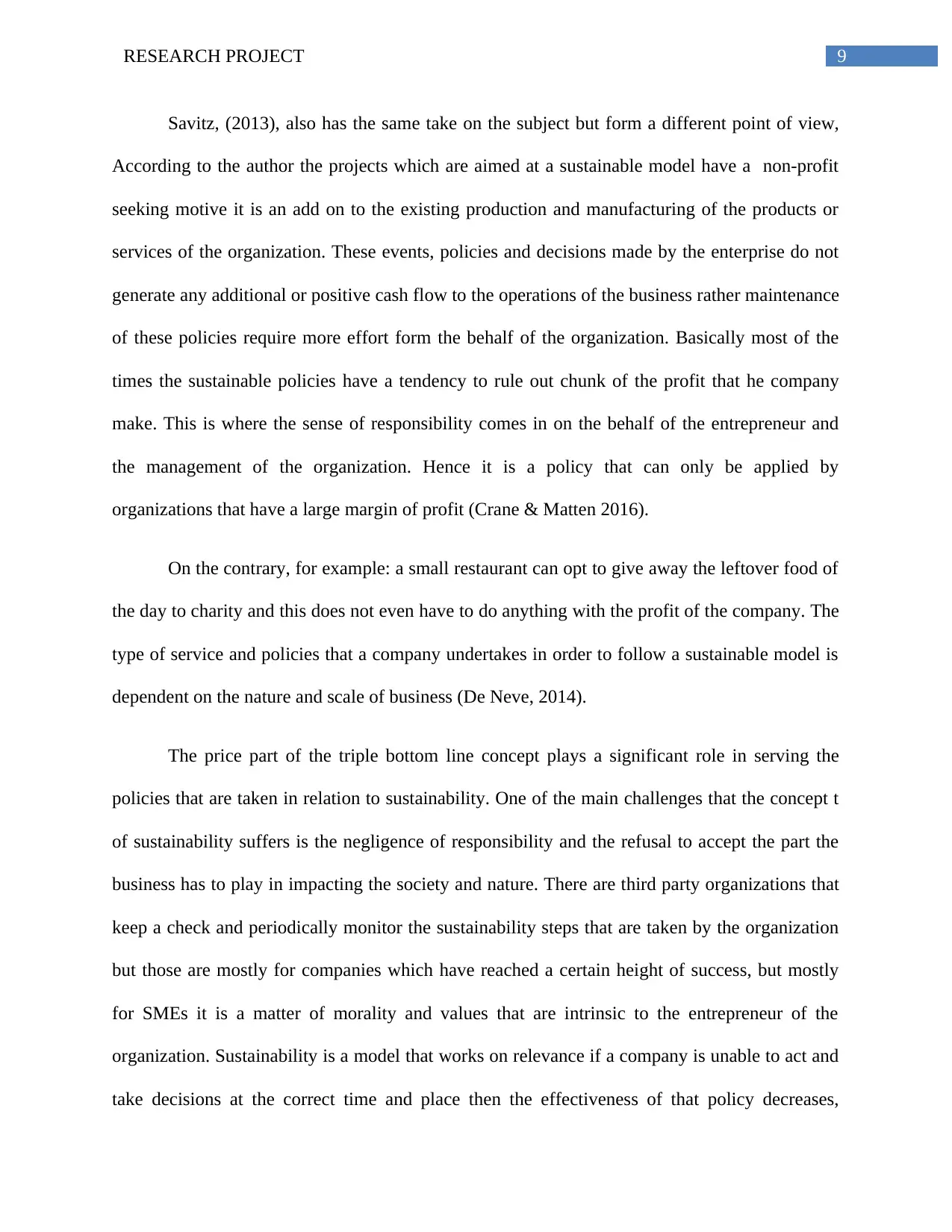
9RESEARCH PROJECT
Savitz, (2013), also has the same take on the subject but form a different point of view,
According to the author the projects which are aimed at a sustainable model have a non-profit
seeking motive it is an add on to the existing production and manufacturing of the products or
services of the organization. These events, policies and decisions made by the enterprise do not
generate any additional or positive cash flow to the operations of the business rather maintenance
of these policies require more effort form the behalf of the organization. Basically most of the
times the sustainable policies have a tendency to rule out chunk of the profit that he company
make. This is where the sense of responsibility comes in on the behalf of the entrepreneur and
the management of the organization. Hence it is a policy that can only be applied by
organizations that have a large margin of profit (Crane & Matten 2016).
On the contrary, for example: a small restaurant can opt to give away the leftover food of
the day to charity and this does not even have to do anything with the profit of the company. The
type of service and policies that a company undertakes in order to follow a sustainable model is
dependent on the nature and scale of business (De Neve, 2014).
The price part of the triple bottom line concept plays a significant role in serving the
policies that are taken in relation to sustainability. One of the main challenges that the concept t
of sustainability suffers is the negligence of responsibility and the refusal to accept the part the
business has to play in impacting the society and nature. There are third party organizations that
keep a check and periodically monitor the sustainability steps that are taken by the organization
but those are mostly for companies which have reached a certain height of success, but mostly
for SMEs it is a matter of morality and values that are intrinsic to the entrepreneur of the
organization. Sustainability is a model that works on relevance if a company is unable to act and
take decisions at the correct time and place then the effectiveness of that policy decreases,
Savitz, (2013), also has the same take on the subject but form a different point of view,
According to the author the projects which are aimed at a sustainable model have a non-profit
seeking motive it is an add on to the existing production and manufacturing of the products or
services of the organization. These events, policies and decisions made by the enterprise do not
generate any additional or positive cash flow to the operations of the business rather maintenance
of these policies require more effort form the behalf of the organization. Basically most of the
times the sustainable policies have a tendency to rule out chunk of the profit that he company
make. This is where the sense of responsibility comes in on the behalf of the entrepreneur and
the management of the organization. Hence it is a policy that can only be applied by
organizations that have a large margin of profit (Crane & Matten 2016).
On the contrary, for example: a small restaurant can opt to give away the leftover food of
the day to charity and this does not even have to do anything with the profit of the company. The
type of service and policies that a company undertakes in order to follow a sustainable model is
dependent on the nature and scale of business (De Neve, 2014).
The price part of the triple bottom line concept plays a significant role in serving the
policies that are taken in relation to sustainability. One of the main challenges that the concept t
of sustainability suffers is the negligence of responsibility and the refusal to accept the part the
business has to play in impacting the society and nature. There are third party organizations that
keep a check and periodically monitor the sustainability steps that are taken by the organization
but those are mostly for companies which have reached a certain height of success, but mostly
for SMEs it is a matter of morality and values that are intrinsic to the entrepreneur of the
organization. Sustainability is a model that works on relevance if a company is unable to act and
take decisions at the correct time and place then the effectiveness of that policy decreases,
Paraphrase This Document
Need a fresh take? Get an instant paraphrase of this document with our AI Paraphraser
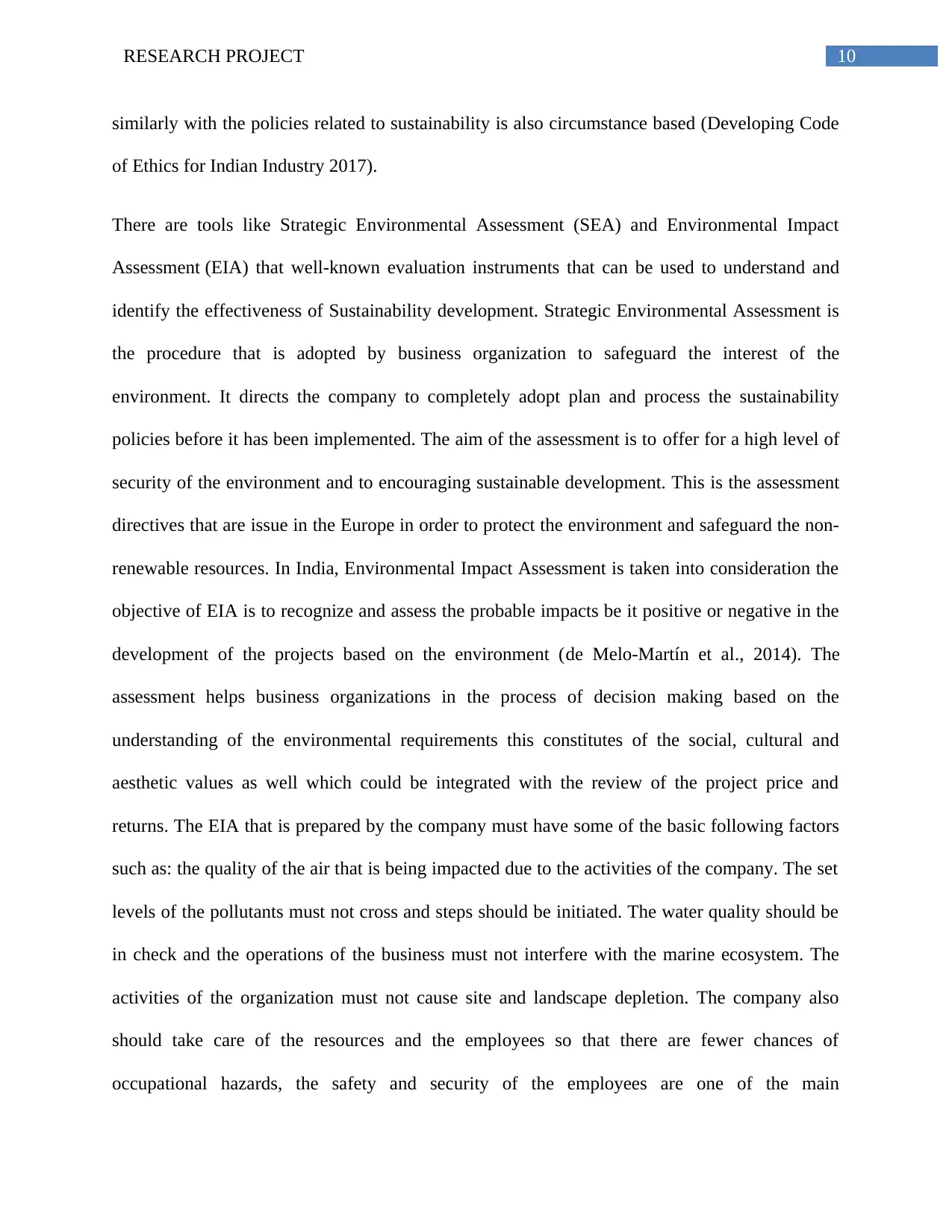
10RESEARCH PROJECT
similarly with the policies related to sustainability is also circumstance based (Developing Code
of Ethics for Indian Industry 2017).
There are tools like Strategic Environmental Assessment (SEA) and Environmental Impact
Assessment (EIA) that well-known evaluation instruments that can be used to understand and
identify the effectiveness of Sustainability development. Strategic Environmental Assessment is
the procedure that is adopted by business organization to safeguard the interest of the
environment. It directs the company to completely adopt plan and process the sustainability
policies before it has been implemented. The aim of the assessment is to offer for a high level of
security of the environment and to encouraging sustainable development. This is the assessment
directives that are issue in the Europe in order to protect the environment and safeguard the non-
renewable resources. In India, Environmental Impact Assessment is taken into consideration the
objective of EIA is to recognize and assess the probable impacts be it positive or negative in the
development of the projects based on the environment (de Melo-Martín et al., 2014). The
assessment helps business organizations in the process of decision making based on the
understanding of the environmental requirements this constitutes of the social, cultural and
aesthetic values as well which could be integrated with the review of the project price and
returns. The EIA that is prepared by the company must have some of the basic following factors
such as: the quality of the air that is being impacted due to the activities of the company. The set
levels of the pollutants must not cross and steps should be initiated. The water quality should be
in check and the operations of the business must not interfere with the marine ecosystem. The
activities of the organization must not cause site and landscape depletion. The company also
should take care of the resources and the employees so that there are fewer chances of
occupational hazards, the safety and security of the employees are one of the main
similarly with the policies related to sustainability is also circumstance based (Developing Code
of Ethics for Indian Industry 2017).
There are tools like Strategic Environmental Assessment (SEA) and Environmental Impact
Assessment (EIA) that well-known evaluation instruments that can be used to understand and
identify the effectiveness of Sustainability development. Strategic Environmental Assessment is
the procedure that is adopted by business organization to safeguard the interest of the
environment. It directs the company to completely adopt plan and process the sustainability
policies before it has been implemented. The aim of the assessment is to offer for a high level of
security of the environment and to encouraging sustainable development. This is the assessment
directives that are issue in the Europe in order to protect the environment and safeguard the non-
renewable resources. In India, Environmental Impact Assessment is taken into consideration the
objective of EIA is to recognize and assess the probable impacts be it positive or negative in the
development of the projects based on the environment (de Melo-Martín et al., 2014). The
assessment helps business organizations in the process of decision making based on the
understanding of the environmental requirements this constitutes of the social, cultural and
aesthetic values as well which could be integrated with the review of the project price and
returns. The EIA that is prepared by the company must have some of the basic following factors
such as: the quality of the air that is being impacted due to the activities of the company. The set
levels of the pollutants must not cross and steps should be initiated. The water quality should be
in check and the operations of the business must not interfere with the marine ecosystem. The
activities of the organization must not cause site and landscape depletion. The company also
should take care of the resources and the employees so that there are fewer chances of
occupational hazards, the safety and security of the employees are one of the main
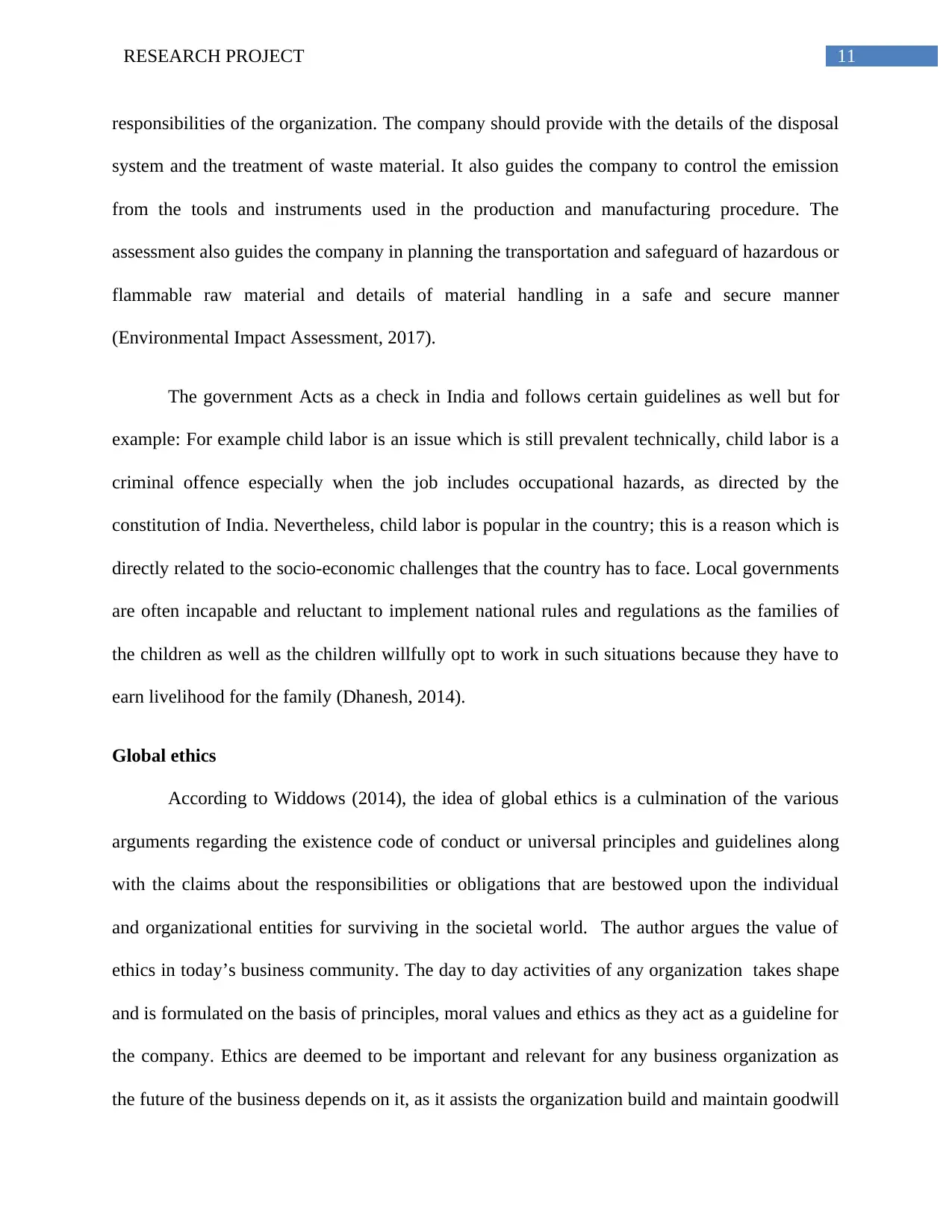
11RESEARCH PROJECT
responsibilities of the organization. The company should provide with the details of the disposal
system and the treatment of waste material. It also guides the company to control the emission
from the tools and instruments used in the production and manufacturing procedure. The
assessment also guides the company in planning the transportation and safeguard of hazardous or
flammable raw material and details of material handling in a safe and secure manner
(Environmental Impact Assessment, 2017).
The government Acts as a check in India and follows certain guidelines as well but for
example: For example child labor is an issue which is still prevalent technically, child labor is a
criminal offence especially when the job includes occupational hazards, as directed by the
constitution of India. Nevertheless, child labor is popular in the country; this is a reason which is
directly related to the socio-economic challenges that the country has to face. Local governments
are often incapable and reluctant to implement national rules and regulations as the families of
the children as well as the children willfully opt to work in such situations because they have to
earn livelihood for the family (Dhanesh, 2014).
Global ethics
According to Widdows (2014), the idea of global ethics is a culmination of the various
arguments regarding the existence code of conduct or universal principles and guidelines along
with the claims about the responsibilities or obligations that are bestowed upon the individual
and organizational entities for surviving in the societal world. The author argues the value of
ethics in today’s business community. The day to day activities of any organization takes shape
and is formulated on the basis of principles, moral values and ethics as they act as a guideline for
the company. Ethics are deemed to be important and relevant for any business organization as
the future of the business depends on it, as it assists the organization build and maintain goodwill
responsibilities of the organization. The company should provide with the details of the disposal
system and the treatment of waste material. It also guides the company to control the emission
from the tools and instruments used in the production and manufacturing procedure. The
assessment also guides the company in planning the transportation and safeguard of hazardous or
flammable raw material and details of material handling in a safe and secure manner
(Environmental Impact Assessment, 2017).
The government Acts as a check in India and follows certain guidelines as well but for
example: For example child labor is an issue which is still prevalent technically, child labor is a
criminal offence especially when the job includes occupational hazards, as directed by the
constitution of India. Nevertheless, child labor is popular in the country; this is a reason which is
directly related to the socio-economic challenges that the country has to face. Local governments
are often incapable and reluctant to implement national rules and regulations as the families of
the children as well as the children willfully opt to work in such situations because they have to
earn livelihood for the family (Dhanesh, 2014).
Global ethics
According to Widdows (2014), the idea of global ethics is a culmination of the various
arguments regarding the existence code of conduct or universal principles and guidelines along
with the claims about the responsibilities or obligations that are bestowed upon the individual
and organizational entities for surviving in the societal world. The author argues the value of
ethics in today’s business community. The day to day activities of any organization takes shape
and is formulated on the basis of principles, moral values and ethics as they act as a guideline for
the company. Ethics are deemed to be important and relevant for any business organization as
the future of the business depends on it, as it assists the organization build and maintain goodwill
⊘ This is a preview!⊘
Do you want full access?
Subscribe today to unlock all pages.

Trusted by 1+ million students worldwide
1 out of 36
Related Documents
Your All-in-One AI-Powered Toolkit for Academic Success.
+13062052269
info@desklib.com
Available 24*7 on WhatsApp / Email
![[object Object]](/_next/static/media/star-bottom.7253800d.svg)
Unlock your academic potential
Copyright © 2020–2026 A2Z Services. All Rights Reserved. Developed and managed by ZUCOL.




